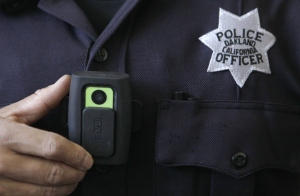The Other Side of The Coin: Digital Cameras Used to Back the Police’s Side of The Story

Image courtesy of http://www.npr.org/2011/11/07/142016109/smile-youre-on-cop-camera
Over the last year or so, we’ve seen a tremendous amount of social activism that is supported through people’s use of social media, particularly on their cell phones. The Arab Spring is a particularly good example of this, as well as the labor protests in Spain and other parts of Europe. In these instances, individuals have taken advantage of texting, Twitter, and Facebook to coordinate public protests, while others have used mobile devices to take photos and video footage of events. These materials are then posted to a variety of social media forums and are often taken up by news agencies and human rights organizations to draw awareness to events. In this way, individual citizens are witnessing events and creating information that often calls attention to abuses and violence against people seeking to defend or garner human rights for themselves.
Given all of the stir that this sort of citizen witnessing is causing, and the fact that the images and videos collected from cell phones can be used as evidence against individuals, public agencies (such as police forces), or even governments, it isn’t too surprising that these same groups are getting savvy and beginning to collect their own digital documentation to as potential evidence defending certain actions. As a story aired on NPR on November 7, 2011 demonstrates, this is exactly what is happening in Oakland, CA as well as smaller towns in the US:
The next time you talk to a police officer, you might find yourself staring into a lens. Companies such as Taser and Vievu are making small, durable cameras designed to be worn on police officer’s uniforms. The idea is to capture video from the officer’s point of view, for use as evidence against suspects, as well as to help monitor officers’ behavior toward the public.
As stated in the article, police departments feel that all to often, they have no hard evidence to back up their side of cases investigating officers for wrong-doing. These cameras would allow them to gather such material. However, the cameras also raise other human rights related issues, such as questions about unauthorized surveillance or invasion of privacy.
leave a comment